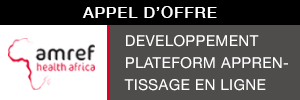.
Organizational context
This Vacancy Announcement is advertised for several Country Director positions (P-4) in Abidjan, Cote d'Ivoire and possible other locations in West and Central African countries.
The International Fund for Agricultural Development (IFAD) is an international financial institution and a specialized United Nations agency dedicated to eradicating rural poverty and hunger.
It does so by investing in rural people.
IFAD finances programmes and projects that increase agricultural productivity and raise rural incomes, and advocates at the local, national and international level for policies that contribute to rural transformation.
Post's organizational accountability
The Programme Management Department (PMD), under the leadership of an Associate Vice-President, is responsible for the overall programme of loans and grants of the Fund and is composed of five (5) regional divisions and the Operational Policy and Results Division.
Under the overall supervision of the regional Division Director and the administrative supervision of the Head of the relevant IFAD Sub-regional Hub/SSTC and Knowledge Centre, the Country Director is responsible for management of the assigned portfolio and related staff.
The Country Director is accountable for the IFAD core values of integrity, transparency, and equity in the management of assigned portfolio.
The Country Director’s accountabilities/key results also include advocacy for and enhancement of national government programmes that improve the access of poor rural people to natural resources; agricultural technologies; financial services; markets; employment opportunities and enterprise development.
The Country Director additionally promotes capacity building of key government counterparts and the rural poor in terms of the skills required for their participation in national and local policy and programming processes.
The key results expected comprise five broad thematic areas:
Country Strategy Management
Country Programme Management
IFAD Institutional Leadership and Partnership Development
Contribution to Policy Leadership
Office Management
Country Directors are overall supervised by the relevant Division Director and administratively supervised by the Head of the relevant Sub-regional Hub or SSTC Knowledge Centre. S/he also receives first-level operational support from the Head of the relevant Sub-regional Hub, SSTC Knowledge Centre or assigned Country Director at P5 level.
Key results expected / Major functional activities
1. COUNTRY STRATEGY MANAGEMENT: The Country Director leads strategic positioning and country strategy development.
S/he is accountable for leading and managing the development and implementation of medium to longer-term strategies (COSOP) for IFAD’s collaboration with governments and other national stakeholders for agricultural development and rural poverty reduction following the principle of ownership, alignment and harmonization.
This entails analysis of the dynamics of agricultural development and rural poverty reduction; development of relevant country-specific strategies; and the definition of IFAD’s value added in this context.
2. COUNTRY PROGRAMME MANAGEMENT: The Country Director manages IFAD programme and related IFAD-funded projects within the portfolio assigned by the Division Director.
S/he leads the design and supervision of the projects as well as loan and grant negotiations, all in accordance with IFAD’s applicable policies.
The Country Director is accountable for analysing relevant information, assisting in the periodic monitoring and evaluation of results achieved and reporting on and dissemination of findings.
S/He contributes effectively to the IFAD organizational change agenda, with reference to issues related to IFAD’s direct supervision and implementation support modalities.
3. INSTITUTIONAL REPRESENTATION AND PARTNERSHIP MANAGEMENT: The Country Director ensures IFAD presence at country-level. S/he contributes to catalyse effective partnerships with a broad range of stakeholders in agricultural development and rural poverty reduction, including government and non-governmental institutions, bilateral and multilateral financing institutions, civil society organizations, research centers and the private sector.
Additionally, S/he enhances IFAD’s relationship and collaboration with in-country partners focusing on synergies and coordinated strategies with multilateral/bilateral donors and civil-society organizations involved in agricultural development and rural poverty reduction. S/he represents IFAD on the UN Country Team, acting as the primary point of contact to transmit IFAD's decisions, and provides support in the coordination of operational activities for development, and contributes to all international and national meetings/thematic groups meetings.
4. CONTRIBUTION TO POLICY LEADERSHIP: The Country Director contributes to corporate level strategy on core IFAD policy positions within the assigned portfolio, led by Division Directors.
S/he maintains and promotes constructive dialogue on the development of pro-poor agricultural development and rural poverty reduction policies and in enabling the rural poor to advocate for institutional transformation.
S/he regularly participates in relevant policy meetings and events of interest to IFAD’s target groups and which involve the government, donors, and civil society, including NGOs, to render the policy dialogue agenda both credible and sustainable.
S/he contributes to IFAD's policy intelligence with regular updates and information exchange on relevant policy discussions and ensure proper knowledge management in place.
Policy dialogue focuses on seeking to link the realities on the ground and the voices of the poor with national policies and programmes.
5. OFFICE MANAGEMENT: The Country Directors supports the Head of the relevant Sub-regional Hub/SSTC and Knowledge Centre in managing the utilization of the allocated resources.
As such, s/he supports the management of human resources, contracting goods and services, and financial management.
S/he also supports budget preparation, management, and monitoring of expenditures.
Impact of Key results / Key performance indicators
The Country Directors provide technical and managerial leadership to the substantive development and execution of the assigned country programme(s), including providing
(i) managerial direction to programme analysts and officers (up to P-3 level), country programme officers and assistants as well as administrative assistants;
(ii) effective country present and representation with government counterparts and other programme collaborators; and
(iii) ability to anticipate and manage potential risks to the success of programmes.
Representation / Work relationships
COMMUNICATIONS:
The Country Director serves as the IFAD spokesperson in the country concerned and, in carrying out this role and when required, draws on the advice and expertise of IFAD’s Communications Division (COM).
The Country Director holds regular consultations with IFAD counterparts — line ministries and governmental bodies at all administrative levels, donors, civil society — to enhance the effectiveness and impact of IFAD operations.
The Country Director also seeks to improve coordination among IFAD, the government and key development partners with a view primarily to ensuring synergy and a common approach to emerging agricultural development and rural poverty reduction strategies, policies and investment programmes.
S/he serves as IFAD’s liaison with project authorities and helps in addressing administrative and programme-related substantive issues, such as targeting and identifying needs for technical backstopping.
The Country Director proactively works with project management to ensure compliance with IFAD policies and overall orientation towards the achievement of results and impact.
As a senior expert on country programme formulation and delivery, the Country Director’s effectiveness as an advocate and trusted counterpart substantially affects IFAD’s image as a reliable and creative partner.
Country Directors originate and manage new country-level projects or programmes in the assigned portfolio. Going beyond established procedures or models, their substantive contributions reflect new approaches that materially expand the range of services or programmes delivered at the country-level.
Programme design and development activities reflect authoritative technical capacity in performing the Head of Country Programme role. Externally the impact on the overall IFAD programme is significant in projecting the organization’s role/capacity as a reliable partner with a qualitative edge at the national level.
Competencies
Organizational
• Strategic thinking and organizational development: Strategic leadership Level 1)
• Demonstrating Leadership: Leads by example; initiates and supports change (Level 2)
• Learning, sharing knowledge and innovating: Challenges, innovates and contributes to a learning culture (Level 2)
• Focusing on clients: Contributes to a client-focused culture (Level 2)
• Problem solving and decision making: Solves complex problems and makes decisions that have wider corporate impact (Level 2)
• Managing time, resources and information: Coordinates wider use of time, information and/or resources (Level 2)
• Team Work: Fosters a cohesive team environment (Level 2)
• Communicating and negotiating: Acquires and uses a wide range of communication styles and skills (Level 2)
• Building relationships and partnerships: Builds and maintains strategic partnerships internally and externally (Level 2)
• Managing performance and developing staff: Manages staff and teams effectively (Level 1)
Technical
• Senior expert in programme development and management as well as specific expertise in rural project management and market development.
• Extensive field experience related to agricultural and rural development.
• Excellent knowledge of policy oriented, programme based pro-poor approaches and loan and grant preparation.
• Capacity to communicate fluently with different counterparts (civil society, government authorities, local communities, project staff) to align parties and build networks.
• Ability to represent IFAD as a trusted and reliable partner.
• Good international knowledge of economics and/economic development
• Communicates verbally and in writing clearly, succinctly and convincingly; listens and communicates effectively to engage others.
• Demonstrated analytical skills in order to identify systemic issues and derive viable, sustainable solutions.
Minimum recruitment qualifications
Education:
• Advanced university degree from an accredited institution in rural development, agriculture, rural finance, development policy or other job related fields with a preference for economics.
Experience:
• Eight (8) years of progressively responsible international experience [in international organizations, rural development/financial institutions or government services], preferably in area of implementation and supervision of rural development programmes of which at least two (2) years' experience working in an international organization.
• Experience may include project design, development, implementation and evaluation.
Language requirements:
• Excellent written and verbal communication skills in English and proficiency in French. Working knowledge of another official language (Arabic or Spanish) is desirable.









